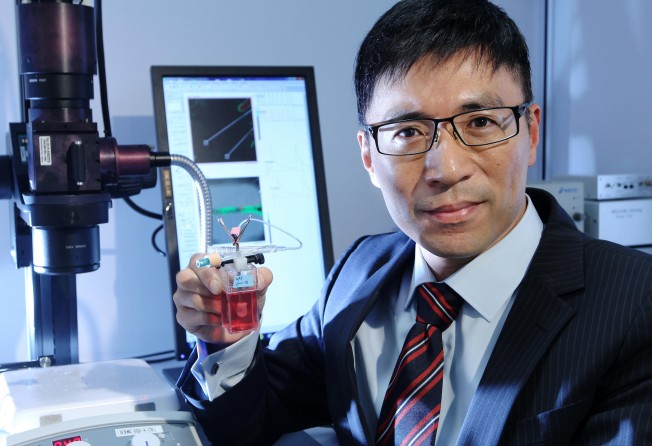Mini-hearts created from stem cells could help put new drugs to the test
Professor Li hopes 'pluripotent' technique can save lives by helping put new drugs to the test

I'm looking at a human mini-heart. Well, a model of a mini-heart. A person can give 2.5ml of blood to Professor Ronald Li Tang-wai and his team; within six months, they can create the stem cells, which in turn can build a blood-ejecting mini "cloned" human heart. The potential is huge. And it's a world first.
Li's mini-heart is created by using "pluripotent" stem cells, which can also be turned into other types of cells and tissues in the body.
"As soon as I get your blood," he says, "I can turn it into pluripotent stem cells. So first we get the raw material, then we tell these stem cells to become ventricular heart muscle cells, followed by assembling them into the desired three-dimensional forms, such as a patch, a fibre or a heart for different purposes."
The human heart has a billion cells, says Li. The heart his team has created is the same size as that of a fetus - but even with a partial adult heart, he says, it could be used to revolutionise drug discovery immediately.
Drugs could be tested on bio-artificial human hearts to see their impact, levels of toxicity, and side-effects. Many people, he says, who take hard-hitting cancer drugs end up with cardiovascular issues, or even die from heart failure because the drugs are so toxic. Doctors cannot tell who are more susceptible to drug-induced heart problems.
This would provide a safe environment for patients and drug companies to try out drugs.
"Cardiac toxicity is a common serious effect of numerous new as well as marketed drugs, not just those for the heart," says Li, 44, whose company has signed a strategic partnership with a major pharmaceutical firm.
"Currently the patients are guinea pigs," says Li, "but we can use the mini-hearts to work out both the positive and negative effects of a drug. We can develop hundreds of thousands of mini-hearts at a time, and "personalise" them if we need to."
Li is the founder of Novoheart and director of the Stem cell and Regenerative Medicine Consortium at the University of Hong Kong.
This could be the future of organ transplants, he says. Stem cell-derived, bio-artificial cloned organs built from the patient's own blood, which means the patient would not need to fight their own immune system with drugs so that the body did not reject the transplant. There would be no need to wait for a donor.
"I'm a big believer in bio-artificial human organ banks," says Li. Stem cell technology is not without controversy, but Li says it's a question of more education for the public.
"In general, whenever a new technology comes along … there is always some controversy surrounding it." He cites the introduction of In-vitro Fertilisation, or IVF, in the 1970s, which people were initially wary of but is now just another fertility treatment.
Stem cell technology is a very personal business, he says. The strongest advocates are often sufferers themselves.
For Li, a major driver is his late son, Aidan, who died as a baby eight years ago.
He had a rare condition called Congenital Diaphragmatic Hernia. A stem cell technology is being developed, but was not yet available in the US, where they were living, to treat Aidan.
So, Li and his wife look forward to when the technology will exist to treat other children with currently incurable conditions.
Li has been nominated for the Innovating for Good Award of this year's Spirit of Hong Kong Awards by the Hong Kong Science and Technology Park Corporation.